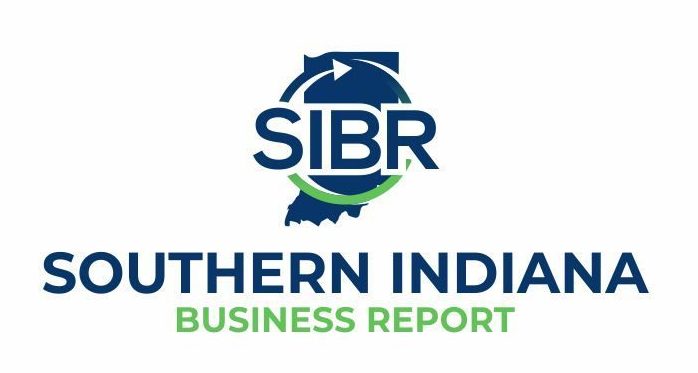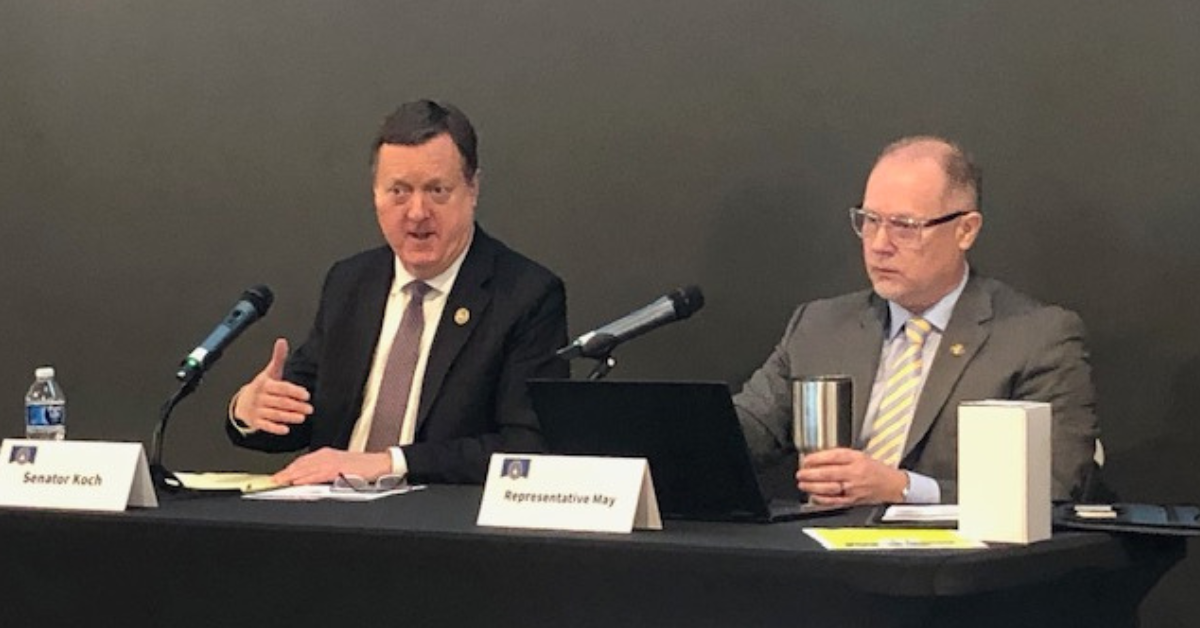Carol Johnson, Southern Indiana Business Report
BEDFORD – Concerns about increased property assessments, health care costs and public health funding were among questions posed to legislators representing Lawrence County at the Bedford Chamber’s Breakfast with the Legislators Friday at StoneGate Arts & Education Center.
State Sen. Eric Koch, and State Rep. Chris May answered questions and provided an update on the legislative session, which is at the half-way mark. The legislature will pass a budget this session and May said the second half of the session will become active very quickly as bills work their way through both chambers.
Local governments and schools set their budgets based on anticipated property tax revenue. May said a study was conducted indicating that assessed property values are expected to increase 16-25% this year.
The sudden spike is due to higher home prices in 2022, which followed a period of historically low interest rates. Low rates led to more home buyers and houses were fetching much higher prices.
Responding to a question from Scott Smith about potential property tax relief, Koch said there’s been a lot of discussion about property tax relief, including taking a holistic look at the state’s tax system. Koch does not serve on the tax and fiscal policy committee but said the committee is looking into the issue of property tax relief.
“I predict you’ll see one or more serious attempts to address that,” Koch said.
May said he anticipates “quite an uprising” from homeowners when they receive their tax bills this spring that are significantly higher.
“For folks living on fixed incomes, it’s going to be a heck of a hit,” he said.
One possibility, May said, is increasing the homestead exemption, a deduction for homeowners who live in their homes. But that won’t help owners of rental properties, who will likely raise their rents to compensate for the increased taxes.
Smith said the increase will make the issue of affordable rental housing in the state more challenging.
Health care
IU Health Bedford Hospital COO Larry Bailey asked about potential increases for public health funding, noting the increasing numbers of Hoosiers living with chronic diseases. Gov. Eric Holcomb is pursuing $120 million in fiscal year 2024 and another $227 million in fiscal year 2025 to increase public health services across the state.
SB 4 is the Senate’s response to Holcomb’s proposal and would establish a framework for local health departments.
Bailey mentioned the state’s low spending on public health and the state’s high incidence of negative health behaviors such as smoking, obesity and chronic disease.
Indiana spends about $55 a person on public health annually, or about $374 million. The money is used for such things as preventing, detecting and tracking disease outbreaks, as well as tobacco cessation programs, emergency preparedness and infant health programs.
That per-person spending ties Indiana with Arizona and Ohio for second-to-last place, according to America’s Health Rankings 2019 report by the United Health Foundation.
May said there is some overlap among state agencies that address public health and the legislature wants to make sure the funds for public health are allocated correctly and efforts aren’t duplicated.
Shawna Girgis with IU Health Foundation had concerns about proposed bills to control health care costs and how they will affect the operations of hospitals, in particular rural hospitals.
According to a 2022 study from the RAND Corporation, Indiana ranks seventh highest in the nation for hospital costs.
Koch said there’s no simple solution to reining in health care costs. “We’re hearing loud and clear from employers, we’re hearing from average people dealing with uninsured costs so I think there will be some meaningful change. We’re trying real hard to do no harm as we bring reform,” he said. “This didn’t happen overnight. This payment structure has built up over 50 years.”
Government incentives contributed to the problem and need to be looked at as to how incentives have contributed to high healthcare costs, Koch said.
Bedford Mayor Sam Craig raised the issue of municipalities bearing the costs of ambulance service. He said at times Lawrence County has no ambulances available to respond because its ambulances are transporting patients to other facilities.
“We are suffering so much more than bigger cities,” he said. “We’re running into the issue that our fire department is waiting 30 minutes for an ambulance.”
He suggested some of the public health funding could be directed to assisting rural communities with ambulance costs.
Others who spoke were Amy Redman, director of the North Lawrence Career Center, and Stone City Products owner Stewart Rariden.
Rariden asked about potential changes to Indiana’s depreciation law on manufacturing equipment.
“Twenty states don’t even tax manufacturing equipment,” he said. “This falls primarily on capital intensive businesses and I wonder how this is being addressed in the budget this year.”
May said it’s still too soon to say what changes might take place.
“With anything budgetary, there is always a little bit of bartering. There could be a win for you, but there could be a loss somewhere else,” he said.
District priorities
During a district overview, Koch said a survey of voters in District 44 revealed that top concerns regarding the economy and state budget are rising energy costs, government spending and cutting taxes. Other concerns for voters in the survey are creating and retaining jobs, reducing crime and illegal drugs and making health care more affordable.
May highlighted his work as chairman of the Local Government Committee.
He said the contrasts between Indiana rural areas and urban centers are vast. He said rural areas are often overlooked at the state level and the population losses in those communities are having an effect on school funding because funds follow the student.
He said efforts to re-invite high school and programs like the Collaboration of Shoals, Mitchell and Orleans and READI funding for education are creating more opportunities for students to become skilled and stay in their hometowns.



